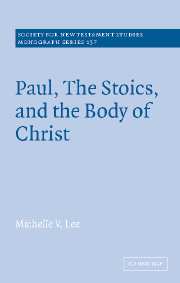Book contents
- Frontmatter
- Contents
- Acknowledgments
- List of abbreviations
- 1 Introduction
- Part I Background: the Stoics, body, and ethics
- Part II 1 Corinthians and the body of Christ
- 5 The community as Christ's body in 1 Corinthians 12
- 6 The role of the νοῦς Χριστοῦ (1 Cor. 1–4)
- 7 The application of the body of Christ: love and prophecy (1 Cor. 13–14)
- 8 Summary and conclusion
- Bibliography
- Index of passages cited
- Index of modern Authors
- Index of subjects
8 - Summary and conclusion
Published online by Cambridge University Press: 23 November 2009
- Frontmatter
- Contents
- Acknowledgments
- List of abbreviations
- 1 Introduction
- Part I Background: the Stoics, body, and ethics
- Part II 1 Corinthians and the body of Christ
- 5 The community as Christ's body in 1 Corinthians 12
- 6 The role of the νοῦς Χριστοῦ (1 Cor. 1–4)
- 7 The application of the body of Christ: love and prophecy (1 Cor. 13–14)
- 8 Summary and conclusion
- Bibliography
- Index of passages cited
- Index of modern Authors
- Index of subjects
Summary
In dealing with the situation at Corinth, Paul was faced not only with the immediate problems in the congregation, such as the abuse of tongues, but with the greater problem of how to bring a young, formerly pagan people to maturity in Christ. For Paul, the issue was not simply how to change their present behavior, but how to bring the congregation to a deeper understanding of how to live out the implications of their new life in Christ. Thus, for the interpreter the issue relates not only to the content of Paul's instructions, but also to how he viewed his instructions as intimately linked to their new existence.
In 1 Cor. 12 Paul is most probably dealing with the misuse of spiritual gifts, particularly tongues. He tailors his answer toward the specific situation – he downplays the importance of glossolalia and builds up his own authority. But at the same time he sets the specific situation within the context of the Corinthians' eschatological existence as the body of Christ. The Corinthians' unity in Christ is the basis for dealing with their specific problem regarding spiritual gifts.
In this way, Paul deals with the problem on two different levels. On one level, he addresses the specific problem of the abuse of spiritual gifts.
- Type
- Chapter
- Information
- Paul, the Stoics, and the Body of Christ , pp. 198 - 200Publisher: Cambridge University PressPrint publication year: 2006



